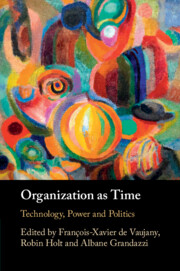Book contents
- Organization as Time
- Organization as Time
- Copyright page
- Contents
- Figures
- Tables
- Contributors
- Organization as Time
- Part I The Politics of Time: Ontologies and Metaphysics of Organization as Time
- Part II Re-orienting Critique in Organization Studies? Exploring Jointly Time and Politics
- Part III New Ways of Organizing Work, Digitality and the Politics of Time
- Part IV History and Duration: Making Things Last, Enduring Politics and Organizing
- 14 Times Alla Turca E Franga
- 15 Temporality and Institutional Maintenance
- 16 A Time for Justice?
- 17 Organizational Memory as Technology
- Conclusion: Time and Political Organizing
- Index
- References
Conclusion: Time and Political Organizing
Five Avenues for Further Research on the Way to Power and Emancipation
from Part IV - History and Duration: Making Things Last, Enduring Politics and Organizing
Published online by Cambridge University Press: 22 June 2023
- Organization as Time
- Organization as Time
- Copyright page
- Contents
- Figures
- Tables
- Contributors
- Organization as Time
- Part I The Politics of Time: Ontologies and Metaphysics of Organization as Time
- Part II Re-orienting Critique in Organization Studies? Exploring Jointly Time and Politics
- Part III New Ways of Organizing Work, Digitality and the Politics of Time
- Part IV History and Duration: Making Things Last, Enduring Politics and Organizing
- 14 Times Alla Turca E Franga
- 15 Temporality and Institutional Maintenance
- 16 A Time for Justice?
- 17 Organizational Memory as Technology
- Conclusion: Time and Political Organizing
- Index
- References
Summary
As we have seen in the context of this rich, edited volume, numerous ways are possible for the exploration of organization as time and the political description of this process as power, emancipation or ethics. A politics of time, at the intersection of critical management studies and process studies, is particularly promising. In this short conclusion, we would like to invite Management and Organization Studies (MOS) researchers to explore five continents: digitality, narrativity, materiality, time-space and subjectivity as five promising ways to think of a politics of organization as time.
Firstly, digitality, in particular digital images (see Barker, 2012 and Chapter 1, this volume, or de Vaujany, 2022a), are more and more central to our ways of working and organizing. Beyond a new visuality, they often settle new temporalities for what is produced through their happening, and these new temporalities also correspond to new forms of power, of agencement, of violences, of state domination.
- Type
- Chapter
- Information
- Organization as TimeTechnology, Power and Politics, pp. 397 - 401Publisher: Cambridge University PressPrint publication year: 2023
References
- 1
- Cited by

